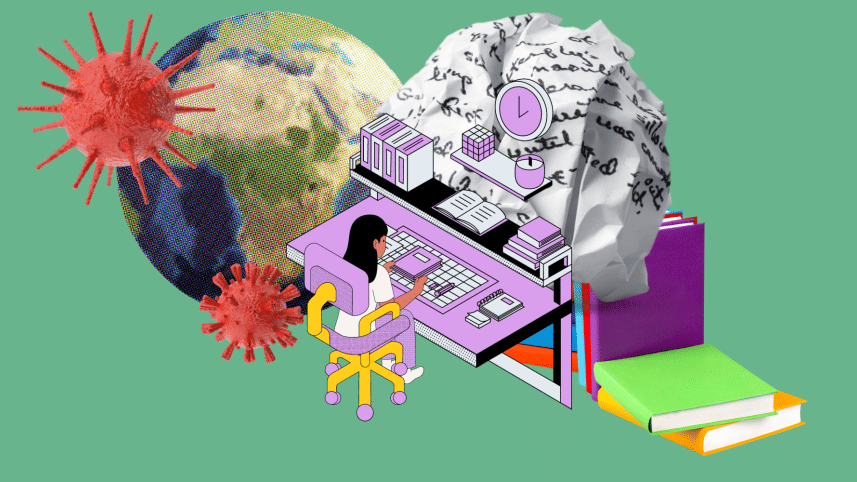Are students still reeling from the pandemic?

It has been a while since we moved away from the "new normal" following the COVID-19 pandemic to a normal we have known all our lives. We have slowly integrated more and more social, educational, and official responsibilities back into our regular routines over the past two years, but one is left to wonder whether we have really left those days behind or if traces of it still remain.
When I look back at the year 2020, all I can remember is my school life ending abruptly on a random Tuesday, board exams getting cancelled after uncertain anxiety-ridden months, finishing what remained of the graduation online, and then being thrust into university come Fall. Next, I experienced a new academic journey from behind a screen for nearly two years, all while dealing with sickness and death around me. Needless to say, for several batches of students, the psychological repercussions were terrible.
Looking back, I realise the damage that those two years of home education had cost me across multiple domains, not just my mental health. While my productivity had definitely suffered in that period, continuous online classes have permanently ruined my study habits and damaged my ability to focus, which means my academics are still somewhat suffering well into in-person education. As I desperately try to rebuild a distraction-free study routine, another semester passes me by.
Without face-to-face interaction, I had not been able to build significant rapport with many of the excellent professors I had, leading to difficulties getting my foot into the door of academic research or even decent letters of recommendation.
Rynak Rahmat, an undergraduate student of Biochemistry at North South University (NSU), experienced a similar predicament. "Since my entire first year was lost to the lockdowns, I did not gain any practical lab experience, which forms the basis of further study in my field. When we returned to campus, all the labs were backlogged so I was only able to take them in my third year. So, when I apply for internships and research positions, I am often underqualified as I have very little practical training considering I am in my final year now," she explained.
Moreover, campus life is supposed to be one of the most cherished days of your lives and I have experienced nothing of that sort. With barely any social skills left, starting over has certainly been difficult. Many students around me, both home and abroad, shared similar sentiments.
"Not being able to start university on campus in my freshman year meant I had no social life when I came here," said Farzan Mirza, a final-year student at New York University. "It has been difficult trying to navigate a new place and connecting with people when they have already settled into their majors, because you make the most friendships in your early days when there are lots of orientation events and people are still figuring things out."
Even more dire effects are suffered by those who had contracted the COVID-19 virus at some point in the last few years. Students have reported having brain fog and difficulty recalling stuff with ease, which had eventually hampered their performance in academic assessments.
"Personally, I have noticed a significant change in my memory retention post-COVID. Material that was once straightforward to memorise now takes longer. I think the stress and mental health issues we encountered during the pandemic plays a role in it, too," shared Orpa Tateyama, an undergraduate student at NSU.
I was surprised to find out I was not the only one to be more forgetful than I am supposed to be at this age. This is actually one of the most frequently reported symptoms of "long COVID", affecting the youth and the older population alike. According to Episode #47 of "Science in 5", a video series hosted by the World Health Organization (WHO), the duration of the condition is unclear, as some patients have described it to last anywhere from three to nine months.
Although we are back living our academic lives in full swing, it would not hurt to show a little compassion to this generation of students who are trying their very best to acclimatise to rigorous learning environments. Awareness sessions on mental health and academic practices hosted by educational institutions would also provide safe spaces for students to share their issues and help each other overcome the damage that COVID-19 left in its wake.
Mashiat Nayeem is a student at North South University.




 For all latest news, follow The Daily Star's Google News channel.
For all latest news, follow The Daily Star's Google News channel. 
Comments